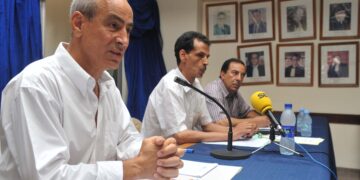Releasing Handfuls of Political Prisoners Ignores Need for Immediate Release of All Unjustly Detained Egyptians
(Washington, D.C, July 7, 2022) – The Egyptian government announced the release of 60 political prisoners today, including 18 workers labeled as terrorists for demanding improved labor rights, and political prisoners who have been held without trial for more than four and a half years. While welcome news for these prisoners and their families, releasing 60 political prisoners while more than 60,000 political prisoners remain jailed or detained does not address the systemic abuses committed by the repressive Sisi government, said Democracy for the Arab World Now (DAWN).
"We welcome the release of these 60 prisoners of conscience, but we also recognize that tens of thousands of political prisoners remain unjustly imprisoned or detained, many of whom have yet to receive a trial and remain imprisoned in appalling conditions," said Mohammed Kamal, Egypt Researcher for DAWN.
Egyptian officials held all 60 prisoners under abusive pretrial detention rules that allow authorities to use recycled charges to imprison detainees for years without receiving a trial. Eighteen detainees faced mass prosecution in Case No. 855 of 2020. This is the same case that the Supreme State Security Prosecution used to bring charges against Solafa Magdy, a prominent journalist and human rights defender, and other prisoners of conscience, merely recycling the same unfounded charges from previous cases in this "new" case. Twelve more of the 60 detainees worked for the Egyptian Insurance Company and faced over one and a half years detention on unproven charges of joining a terrorist organization and spreading false news about the state.
Tariq Al-Awadi, a committee member of the recently reactivated Presidential Pardon Committee, called the list of the 60 detainees approved for release the largest number of detainees released in specific areas, such as worker's rights, in an apparent reference to the 18 detainees in Case No. 855 and 12 detainees that worked for the Egyptian Insurance Company.
The announced release of these political prisoners comes two days after the Egyptian government began its National Dialogue, a series of structured consultations between the government and select political opposition with the stated goal of confronting the challenges that Egypt faces. Many opposition politicians are skeptical of this political process with some calling it a "publicity stunt." DAWN sources said that the government determined which political prisoners would be released before the National Dialogue began and released them to try to assuage concerns of individuals considering participating in the National Dialogue.
"Until the government undertakes real structural reforms, Egyptians will recognize these releases as grossly inadequate steps designed to appease detractors and completely insufficient to end the worst aspects of Sisi's repressive state," Kamal said. "And until Egyptians can speak freely about the most important issues in the country, including political prisoners and a plan for their release, the National Dialogue will remain unsubstantial discourse, useless at best and a harmful distraction at worst," he added.
Of the 60 political prisoners to be released, 23 are held in Tora Prison, 26 in Abu Zaabal Prison, 8 in Al-Qanatar Prison, 1 in Minya Prison, and 2 in Central Prison. Almost all detainees faced charges related to vague national security laws, which the Egyptian government routinely uses to target journalists, human rights defenders, civil society leaders, politicians, and others.
The detainees to be released also include some from the "football club association cases," including Mustafa Jamal Kamel. Egyptian officials detained Kamel, who joined the Zamalek Fans Association, for four and a half years and accused him of joining a terrorist organization.
Since coming to power in a 2013 military coup, President Sisi has overseen sweeping and systematic measures to repress freedom throughout the country. Political prisoners crowd Egyptian prisons, numbering at least 60,000, and prison conditions are brutal, as torture, inhuman treatment, and the purposeful withholding of medical care are commonplace.
Last January, the Biden administration canceled $130 million in military aid to Egypt, but allowed the remainder of the $1.3 billion to go forward despite the country's poor human rights record and Congressional concerns over how the Sisi government would use this aid. The decision to cancel $130 million in military aid also came only days after the U.S. government approved an additional $2.5 billion arms sale to the country.
"As U.S. legislators work to set foreign funding budgets and foreign military sales for 2022, it is imperative that the U.S. government stops bankrolling Sisi's military as long as human rights abuses abound and the political prisoner crisis continues," said Kamal.





































